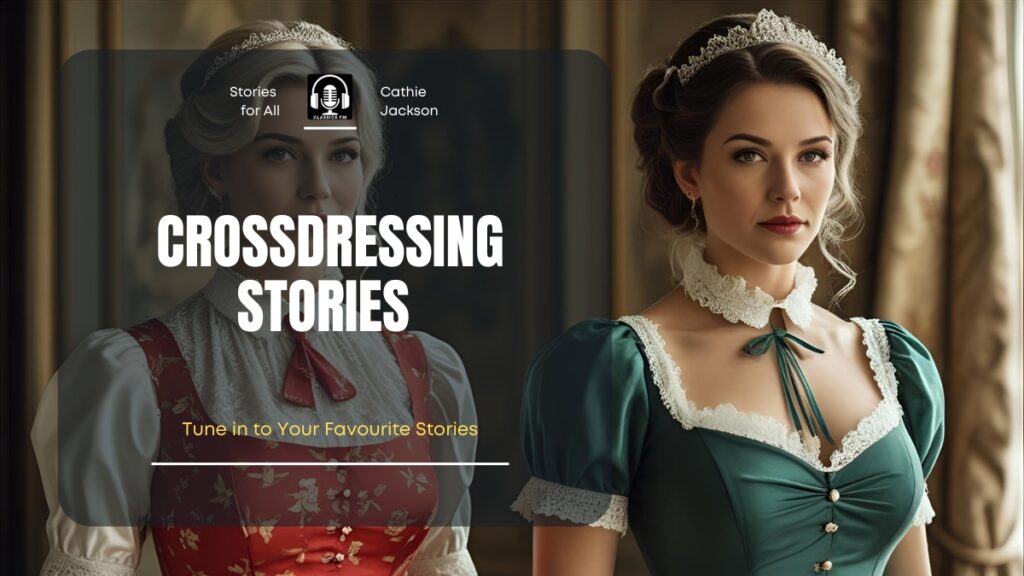Have you ever heard the phrase “Greek Mythology Stories for kids” and wondered what it means? It can sound big and maybe even a little scary.
But actually, it’s full of fun. Gods who argue like family. Heroes who make mistakes. Monsters that surprise you. And lessons you can still use today.
I remember the first time I read a Greek Mythology Story for kids. I was ten. My cousin gave me a book with a shiny golden cover. No pictures at first, just words. I thought, “This might be boring.” But then I read about a god getting really angry at a mortal.
And bam, I was hooked. My imagination went wild. Greek myths grab you, even if you’re just sitting on the couch on a rainy day.
Greek Mythology Stories for Kids
Discover gods, heroes, and magical adventures that teach courage, kindness, and clever thinking!
Hera’s Missing Necklace
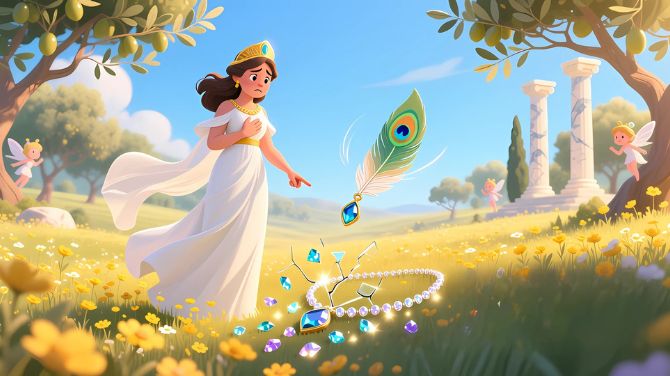
Hera woke up one bright morning.
She stretched her arms.
She yawned.
The sun was shining on Mount Olympus.
Everything looked perfect.
She smiled.
Today was a special day.
A big feast was planned.
All the gods and goddesses were invited.
The table was full of golden plates.
Fruit, ambrosia, honey cakes—so many treats.
Hera had been looking forward to it all week.
She reached for her golden necklace.
Her favorite one.
The one that sparkled like the morning sun.
It wasn’t there.
Her heart skipped a beat.
Hera searched her room.
She looked under pillows.
She looked behind curtains.
She looked in her drawers.
She even looked in her shoes.
Nothing.
The necklace was gone.
Hera frowned.
She tapped her finger on her chin.
“Oh no,” she whispered.
“I can’t go to the feast without my necklace!”
She imagined the other gods looking at her.
“What happened to Hera’s necklace?” they would ask.
She shivered.
This was a big problem.
And problems on Mount Olympus were… well… tricky.
Hera decided she needed help.
She called the little satyrs.
They were tiny, playful creatures.
They had curly hair and long ears.
They were always full of energy.
“Please, little satyrs,” Hera said.
“My golden necklace is missing. Can you help me find it?”
The satyrs bowed.
“Yes, Queen Hera! We will help!”
They clapped their tiny hands.
One of them, Pip, jumped up.
“I love finding things!” he said.
“Me too!” said another, Tilly.
They were bouncing around her feet.
Hera smiled.
“Good,” she said.
“Then let’s begin.”
The satyrs started searching.
They looked in corners.
They peeked under rugs.
They climbed on tables.
They even peeked behind the curtains again.
Pip sniffed the air.
“I smell… something sparkly!” he shouted.
He ran in circles.
“Over here!” Tilly squeaked.
But they only found a few loose beads.
Not the necklace.
Hera sighed.
“This is harder than I thought,” she said.
Pip looked worried.
“I think… maybe it’s hiding,” he said.
“Things do hide sometimes,” Tilly added.
Hera chuckled.
“Well, then we must find it!”
They decided to search the garden next.
The garden was huge.
Full of flowers, fountains, and statues.
Birds were singing.
Butterflies flitted everywhere.
The satyrs ran between the flowers.
They peeked behind bushes.
They checked under the fountains.
They even looked inside the little birdhouses.
Hera followed slowly.
She tried to be patient.
But she was nervous.
The feast was in just a few hours.
She imagined the other gods arriving.
“Where is your necklace, Hera?” they might ask.
“I don’t know,” she imagined replying.
Her cheeks turned red.
She needed to find it.
Then Pip stopped.
He pointed with a tiny hand.
“Over there!” he squeaked.
Hera squinted.
There it was!
The golden necklace!
It was hanging on a tree branch.
How did it get there?
Hera tilted her head.
Then she remembered.
Yesterday, she had taken a walk in the garden.
She had worn the necklace.
A breeze must have knocked it off.
And a bird might have carried it to the branch!
She laughed.
“What a silly thing,” she said.
She carefully climbed the steps to the branch.
The satyrs watched nervously.
“Be careful!” Tilly called out.
Hera reached slowly.
She grabbed the necklace.
It sparkled brighter than ever.
“I’ve got it!” she shouted.
The satyrs cheered.
Hera felt relief.
Her necklace was safe.
The feast could happen.
Hera cleaned herself up.
She brushed her hair.
She polished the necklace.
She put it on carefully.
It felt perfect.
She smiled in the mirror.
“All is ready,” she said.
She turned to the satyrs.
“Thank you, little ones,” she said.
“You were very helpful.”
The satyrs bowed.
“We’re happy to help, Queen Hera!”
At the feast, everything was wonderful.
The gods arrived one by one.
They laughed.
They talked.
They enjoyed the food.
Hera sparkled in her golden necklace.
Everyone noticed.
“What a beautiful necklace!” Athena said.
“It suits you, Hera,” Apollo added.
Hera smiled.
She felt proud.
She thought about the morning.
She remembered the panic.
She remembered the search.
And she realized something important.
Even queens need help sometimes.
Even powerful gods can feel worried.
And that’s okay.
It’s okay to ask for help.
After the feast, Hera told the satyrs a secret.
“Because you helped me today, I will give you a reward,” she said.
The satyrs’ eyes sparkled.
“Anything!” Pip shouted.
Hera thought for a moment.
Then she smiled.
“You will each get a golden whistle,” she said.
The satyrs gasped.
“Wow!” they shouted.
“You can blow it to call the birds, or play music, or just have fun!”
They danced and laughed.
Hera laughed too.
She felt happy.
That night, Hera lay in bed.
She thought about the necklace.
She thought about the morning panic.
She thought about the little satyrs.
She realized something else.
Even in a world full of magic, even on Mount Olympus, sometimes you just need a little help.
And friends—no matter how small—can make a big difference.
Hera smiled and drifted off to sleep.
The golden necklace glittered softly in the moonlight.
And everything felt perfect.
Apollo’s Sunbeam Race
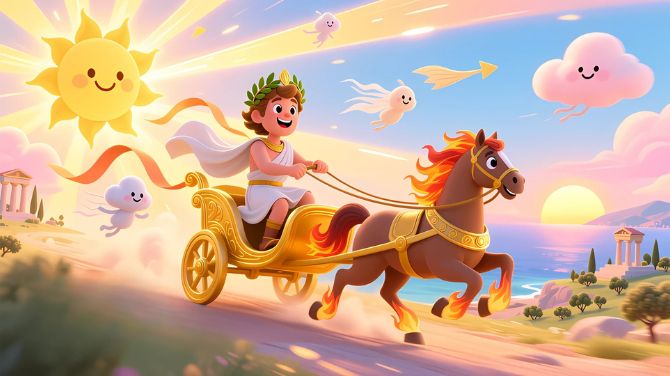
Apollo woke up early.
The sky was pink and orange.
The clouds were soft and fluffy.
He stretched his arms and yawned.
It was going to be a big day.
A very exciting day.
He had an idea.
A crazy, fun idea.
Apollo wanted to race the sun across the sky.
He wanted to see who could move sunlight fastest.
“You can’t just race the sun!” someone might say.
But Apollo was confident.
He had golden chariot.
He had shining horses.
And he had speed.
So why not?
He ran to his chariot.
The horses neighed.
Their hooves sparkled with sunlight dust.
Apollo climbed in.
He grabbed the reins.
He whispered to the horses, “Ready? Let’s go fast!”
They galloped off.
The wind rushed past his hair.
The clouds cheered, or maybe they just moved with the wind.
It was amazing.
He felt unstoppable.
Faster. Faster. Faster.
He laughed.
The birds zipped past him.
Even the mountains looked small.
Apollo was on fire.
He was winning the race… sort of.
But in his excitement, Apollo didn’t notice something.
The clouds above him were moving strangely.
The sky was changing colors.
Orange turned to gray.
The wind howled a little louder.
“Hmm… weird,” Apollo muttered.
But he was too focused on speed.
He didn’t slow down.
He wanted to win the race.
He wanted to show everyone how fast he was.
Faster than the wind.
Faster than the birds.
Faster than anything.
Then… it happened.
A huge cloudstorm formed.
The wind roared.
Rain poured down.
Lightning flashed across the sky.
The horses neighed in surprise.
Apollo tried to steer the chariot.
But the sunlight scattered.
The race was… ruined.
“Oh no!” Apollo shouted.
“I didn’t mean to make a storm!”
He looked at the sky.
The clouds were angry.
The birds were hiding.
Even the flowers on the mountains were shaking from the rain.
Apollo felt worried.
This wasn’t fun anymore.
This was chaos.
Apollo slowed the horses.
He took a deep breath.
He counted to five.
He remembered what his mother, Leto, had told him.
“Patience, Apollo,” she said.
“Rushing causes mistakes. Taking your time brings better results.”
Apollo nodded slowly.
He realized she was right.
He had rushed.
He had only thought about winning.
He had forgotten about the clouds.
He had forgotten about the sky.
He had forgotten about responsibility.
And now… there was a storm.
He decided to fix it.
Apollo guided the horses carefully.
Step by step.
Slowly.
He steered away from the thickest clouds.
He whispered to the sky, “Please, calm down.”
The wind slowed.
The rain eased.
The lightning dimmed.
The clouds started to move gently again.
Apollo smiled.
He realized that taking time worked better.
He realized that rushing only caused trouble.
Once the storm calmed, Apollo had a new idea.
He would race again.
But this time… slower.
Careful. Thoughtful.
He started at the horizon.
The sun sparkled behind him.
He moved carefully.
The horses galloped steadily.
Step by step.
He looked around.
The birds were singing.
The clouds were fluffy again.
Everything felt right.
He laughed.
This was much better than racing recklessly.
Apollo noticed something else.
The sky was beautiful when he took his time.
The colors were soft.
The clouds were glowing.
The mountains looked golden in sunlight.
He realized he had missed all this the first time.
He had been so focused on speed.
He had forgotten to enjoy the view.
Patience wasn’t boring.
Patience made everything brighter.
Along the way, Apollo met some friends.
Helios waved from the other side of the sky.
“You’re going too fast!” Helios called.
Apollo laughed.
“Nope, I’m going carefully now,” he said.
The clouds smiled.
Even the little rain droplets seemed happier.
Apollo felt proud.
He had fixed his mistake.
He had learned a lesson.
And he was still winning… in a better way.
By midday, the sunlight was shining perfectly across the mountains.
The rivers sparkled.
The forests glowed.
The birds sang happily.
The flowers opened.
Apollo felt a warm glow in his heart.
He realized his mistake had taught him something important.
Rushing could be fun… sometimes.
But it could also cause chaos.
Taking time made things better.
He remembered the little satyrs who had cheered him on yesterday.
If he had rushed, they might have been upset too.
If he had rushed, the birds and flowers might have been scared.
Apollo smiled.
“I have to be careful,” he said.
“Even if I want to be the fastest.”
He realized responsibility wasn’t just about winning.
It was about caring.
In the afternoon, Apollo raced again.
This time, slowly but steadily.
Step by step.
The sunlight stretched across the valleys.
The mountains gleamed.
The rivers danced.
Even the clouds seemed happy.
He noticed little things he had missed before.
The way the wind smelled like pine.
The way the grass swayed in patterns.
The way the birds sang together.
It was magical.
He realized speed wasn’t everything.
Enjoying the journey mattered too.
Later, the other gods came to watch.
Athena nodded approvingly.
“Good job, Apollo,” she said.
Hera smiled.
“Patience suits you,” she added.
Even the little clouds seemed to bow in respect.
Apollo beamed.
He realized he had learned something real.
Winning wasn’t just about moving fast.
It was about thinking, caring, and enjoying the ride.
As the sun began to set, Apollo guided the chariot carefully.
The horses trotted slowly.
The sky turned golden and pink again.
The clouds were fluffy and soft.
Everything was calm.
Apollo looked at the horizon.
He felt proud.
Not because he was the fastest.
But because he had done the right thing.
Because he had learned patience.
Because he had taken responsibility.
Because he had fixed his mistake.
And that felt better than winning any race.
That night, Apollo rested under the stars.
He remembered the lesson.
He whispered to the sky, “Tomorrow, I’ll remember patience again.”
The stars twinkled like little reminders.
And the moon smiled softly.
Apollo drifted to sleep, proud, happy, and wise.
The sunlight had traveled safely across the sky.
All was calm.
All was right.
And Apollo had learned something important:
Rushing may be exciting.
But patience makes everything brighter.
Athena’s Clever Labyrinth
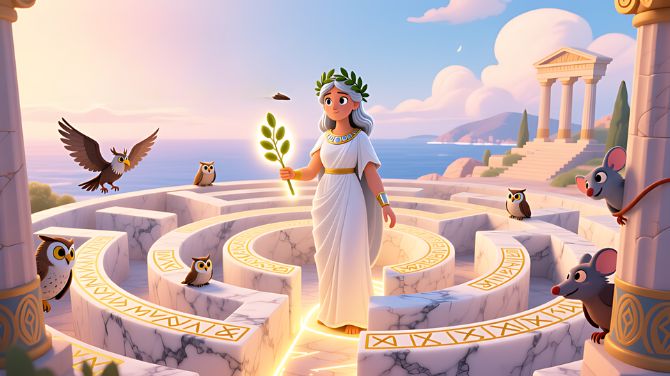
Athena woke up early one morning.
The sun was soft, and the sky was clear.
She had a big idea.
A brilliant idea.
“I will build a labyrinth!” she said.
Not just any labyrinth.
A puzzle labyrinth.
A labyrinth full of twists and turns.
A labyrinth to challenge visiting heroes.
Athena loved cleverness.
She loved thinking.
She loved solving problems.
And she wanted everyone to enjoy thinking too.
She started designing the labyrinth.
She drew winding paths.
Secret doors.
Hidden passages.
Trapdoors that led to puzzles.
Twisting corners that made you think.
Every part was carefully planned.
Athena smiled.
“This will be fun,” she whispered.
“I hope the heroes enjoy it.”
The sun rose higher.
The labyrinth grew bigger.
Walls of white stone.
Doors of golden oak.
Twisting paths that seemed endless.
Even the birds looked amazed.
Soon, heroes began to arrive.
They were strong. Brave. Clever.
Each one wanted to see Athena’s labyrinth.
They laughed as they explored.
Some solved puzzles quickly.
Some got stuck for a while.
But everyone learned something new.
Athena watched proudly.
Her labyrinth was perfect.
Or so she thought.
Then… something unexpected happened.
A little boy wandered near the labyrinth.
He wasn’t a hero.
Not really.
He was small. Curious.
And… very adventurous.
He peeked at the entrance.
The doors were open.
The sunlight glinted off the golden handles.
“Wow!” he whispered.
“It looks amazing!”
Before anyone could stop him, he stepped inside.
The little boy walked carefully.
He followed a path that twisted left.
Then right.
Then left again.
And suddenly… he was lost.
“Oh no,” he said.
He looked around.
The walls were tall.
The paths were confusing.
Every turn looked the same.
He scratched his head.
He felt a little scared.
He didn’t know what to do.
Athena noticed him.
She floated silently above.
Her eyes were sharp.
“Little one,” she said gently.
“You seem lost.”
The boy looked up.
“Oh! Athena!” he exclaimed.
“I didn’t mean to get lost. I just… wanted to see the labyrinth.”
Athena smiled.
“That’s okay,” she said.
“Labyrinths are tricky. They are meant to make you think.”
The boy looked nervous.
“I don’t know how to find my way out,” he said.
Athena nodded.
She wanted him to learn.
“This is a chance to practice thinking,” she said.
“You don’t just walk through a labyrinth. You observe. You ask questions. You try again.”
The boy listened carefully.
Athena knelt beside him.
“Look around,” she said.
“Notice the walls. The doors. The signs.”
“Is there a pattern?” she asked.
The boy squinted.
He looked at the floor.
He looked at the walls.
He looked at the ceiling.
He noticed that some doors had little carvings.
Little symbols.
Some were triangles.
Some were circles.
Some were squares.
“Those symbols might be clues,” Athena said.
“Clues help you figure out the path.”
The boy’s eyes widened.
“Clues?” he asked.
“Yes,” Athena replied.
“Every problem has clues. You just need to notice them.”
She smiled.
“Now, take a deep breath. Think carefully. What’s your first step?”
The boy thought.
He remembered something his teacher once told him.
“Observe first,” he whispered.
“Then act.”
That’s what he did.
He stepped forward.
He chose the door with the triangle.
He walked slowly.
He looked around carefully.
And… he found a small hall with another clue.
It was a painting on the wall.
It showed a path from left to right.
The boy remembered Athena’s words.
“Think. Observe. Ask questions.”
He nodded.
He felt a little more confident.
He realized he could solve this.
Athena watched.
She felt proud.
The boy wasn’t a hero.
Not yet.
But he was learning.
Learning how to think.
Learning how to solve problems.
Learning how to notice small details.
Step by step, he moved forward.
He followed the symbols.
He followed the paintings.
He asked himself questions.
“Left or right?” he whispered.
“Which way makes more sense?”
Sometimes he made a mistake.
Sometimes he had to go back.
But Athena smiled.
Mistakes were part of learning.
After a while, the boy reached a fork.
Two paths.
Both looked similar.
He scratched his head.
He remembered Athena’s advice.
“Observe,” he said aloud.
He looked at the walls.
The right path had a small crack in the stone.
A tiny mark.
“That must be a clue,” he said.
He chose the right path.
It was correct.
He smiled.
His confidence grew.
Finally, after many twists and turns, he reached the exit.
The sunlight shone warmly on his face.
He took a deep breath.
“I did it!” he shouted.
Athena appeared beside him.
“Very good!” she said.
“You noticed the clues. You thought carefully. You asked questions when needed.”
The boy beamed.
“I learned how to solve a tricky problem!”
Athena nodded.
“That’s the most important lesson. Thinking, observing, and asking questions can help you with anything.”
The boy ran to tell his friends.
“They solved it! They solved Athena’s labyrinth!” he shouted.
The heroes looked amazed.
The little boy laughed.
He felt proud.
He realized that cleverness wasn’t about being the strongest.
It was about using your brain.
About paying attention.
About learning from mistakes.
Athena smiled as she watched the boy.
She thought about the labyrinth.
She thought about the heroes.
And she thought about all the little learners who would visit one day.
She realized something important.
Challenges aren’t meant to scare you.
Challenges are meant to teach you.
And learning can be fun if you take it step by step.
Later, Athena gave the boy a small reward.
A golden feather.
“It’s a reminder,” she said.
“A reminder that thinking carefully helps you solve problems.”
The boy hugged it tightly.
He promised himself he would always remember the lesson.
That evening, the labyrinth glowed softly under the moonlight.
The stones sparkled.
The doors whispered secrets.
Athena floated above, proud and happy.
She knew that her labyrinth was more than a puzzle.
It was a lesson in life.
It taught patience.
It taught observation.
It taught problem-solving.
It taught that mistakes are okay if you learn from them.
And it taught that anyone, even a small curious boy, could be clever.
The boy went home, still thinking about the labyrinth.
He imagined other challenges he could solve.
He imagined new puzzles he could create.
He imagined himself thinking carefully in school, at home, and with friends.
Athena’s lesson had sunk in.
He knew that thinking carefully, observing, and asking questions could help him every day.
Even outside the labyrinth.
Athena watched as the stars appeared in the sky.
She felt satisfied.
The labyrinth had worked perfectly.
It had been challenging.
It had been fun.
And it had taught an important lesson.
A lesson about critical thinking.
A lesson about solving problems.
A lesson about growing wiser step by step.
Athena smiled.
The little boy had learned something powerful.
And so had anyone who would try the labyrinth next.
It wasn’t about speed.
It wasn’t about strength.
It was about using your brain.
And that, Athena thought, was the greatest power of all.
Poseidon and the Tiny Turtle
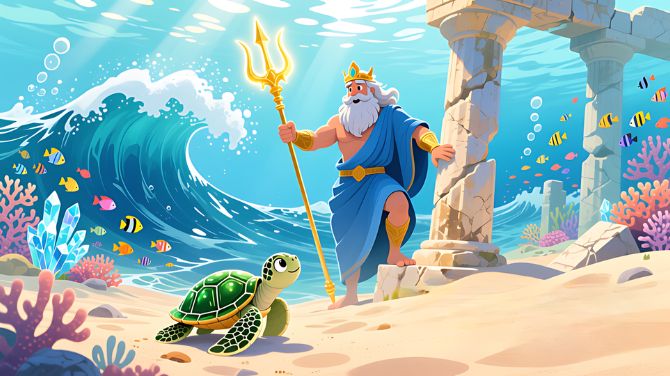
Poseidon woke up under the waves.
The ocean shimmered in the morning sun.
Fish swam quickly around the coral.
Seahorses twirled among the plants.
Octopuses waved their arms lazily.
The water smelled fresh.
It was a perfect day.
Poseidon stretched.
He was ready for adventure.
As he swam near a coral reef, he noticed something strange.
“Squeak… squeak…”
A tiny sound, high and soft.
Poseidon looked closer.
A little sea turtle was stuck.
Its flippers flailed in a small whirlpool.
“Oh no!” Poseidon exclaimed.
He dove down carefully.
His trident cut through the swirling water.
He reached the tiny turtle.
The whirlpool tried to pull the turtle back.
Poseidon guided it gently.
Step by step.
Careful… careful…
Finally, the turtle was free.
It landed safely on a soft patch of sand.
It blinked at him.
Its little flippers trembled.
“You’re safe now,” Poseidon said softly.
The turtle made a happy squeak.
Poseidon chuckled.
“You’re a brave little one.”
The turtle started crawling slowly.
Poseidon followed.
He noticed the water nearby was filled with trash.
Little nets, pieces of rope, floating plastic.
“Oh no,” he murmured.
The turtle might have gotten trapped because of it.
Poseidon knew he had to act.
He lifted the nets carefully.
He gathered plastic bits.
He whispered to the ocean, “We need to protect our home.”
The water shimmered in response.
The tiny turtle flapped its flippers happily.
Poseidon guided it past the debris.
He showed the little one how to avoid sticky nets.
Step by step, flipper by flipper.
The turtle seemed to understand.
It nudged a piece of floating seaweed away.
It moved toward safer water.
Poseidon smiled.
Even tiny creatures can learn to help.
Even tiny creatures can make a difference.
Suddenly, a small crab scuttled into trouble.
Its claw was stuck under a rock.
The little turtle tried to help.
Poseidon gently lifted the rock.
The crab was free.
The turtle squeaked excitedly.
“See?” Poseidon said.
“Helping others is part of living in the ocean.”
The turtle nodded—or at least, it seemed to.
It was learning.
It was growing.
A school of fish swam nearby.
One was tangled in a thin net.
Poseidon reached out and freed it.
The little turtle watched carefully.
It nudged another piece of net away.
Poseidon realized the turtle was learning empathy.
Not just for itself.
But for others too.
Step by step.
Helping by observing.
Helping by caring.
Poseidon led the turtle to a safe lagoon.
The water was calm and clear.
Soft sand covered the bottom.
Seaweed swayed gently.
The turtle looked around, blinking.
It flapped its flippers.
It seemed happy.
Poseidon watched.
He realized helping one small turtle could inspire a ripple of kindness.
Even the tiniest creature matters.
The turtle explored the lagoon.
It peeked under rocks.
It swam through small caves.
It waved at fish.
It nudged crabs.
Poseidon followed.
He made sure the little one stayed safe.
He watched it learn.
He watched it grow.
And he felt proud.
Along the way, Poseidon noticed more creatures in need.
A baby octopus trapped in seaweed.
A seahorse stuck between coral branches.
A starfish caught on a piece of floating plastic.
He helped each one.
And the tiny turtle watched.
It tried to help too.
It nudged, flapped, and guided.
Step by step.
Flipper by flipper.
Helping made the turtle stronger.
Helping made the ocean brighter.
Poseidon reflected.
Even the smallest acts matter.
Helping one creature can lead to helping many.
Caring for the ocean is everyone’s responsibility.
Even little turtles.
Even tiny fish.
Even humans who visit and play in the sea.
Every action counts.
Every act of kindness ripples outward.
After a long day, the little turtle found a safe spot.
It looked back at Poseidon.
It seemed to say thank you.
Poseidon laughed softly.
“You’re welcome, little one,” he said.
“You were brave and caring today.”
The turtle flapped its flippers.
It dove happily into the blue lagoon.
Poseidon watched it disappear.
He felt a warm glow in his heart.
Later, Poseidon floated near a coral reef.
He noticed how calm the water was.
How clean the sand looked.
How fish swam freely.
The little creatures were safe.
The ocean sparkled in the sunlight.
He realized that small acts of kindness had a big impact.
Even a tiny turtle could teach a big lesson.
Poseidon remembered humans sometimes leaving trash in the water.
He knew it could trap creatures.
He vowed to protect them.
He would guide currents.
He would clear debris.
He would watch over the tiniest turtle, crab, and fish.
Even the smallest effort made a difference.
Even a tiny turtle mattered.
That evening, the sun shone softly on the waves.
The little turtle slept safely.
The water rippled gently.
The stars reflected on the surface.
The ocean was calm.
Poseidon smiled.
He had done something good.
He had helped someone smaller.
He had made the ocean a little safer.
He had taught the little turtle to care.
Poseidon whispered to the ocean, “We will care for each other. We will care for our home.”
The waves shimmered.
The fish twirled.
The little turtle peeked from the lagoon.
It seemed to smile.
Poseidon smiled back.
Kindness was magical.
Caring was magical.
Helping others made the ocean happy.
That night, Poseidon rested in his underwater cave.
He thought about the day.
About the little turtle.
About every creature he helped.
He knew one small act could lead to another.
Every life mattered.
Every flipper, fin, and claw mattered.
Mistakes happen.
But care and love can fix many things.
The little turtle slept soundly.
The waves sang softly.
The moon glowed over the water.
The stars sparkled.
Poseidon drifted into a peaceful sleep.
He dreamed of helping more turtles.
More fish.
More creatures in need.
He dreamed of a clean, safe, happy ocean.
And he knew that every small act of kindness mattered.
Even tomorrow, Poseidon knew, the little turtle would swim safely.
The fish would play freely.
The crabs would scuttle happily.
And the ocean would be alive with laughter and life.
Small actions.
Big impact.
Kindness spreads, like ripples on water.
Even the tiniest turtle could inspire the biggest change.
The ocean slept peacefully that night.
Poseidon smiled.
He knew that caring for others—big or small—was the most important thing.
And that protecting the ocean was part of being responsible.
The little turtle had learned to help.
The ocean had learned to shine.
And Poseidon had learned that kindness was the greatest magic of all.
Hermes’ Winged Sandals
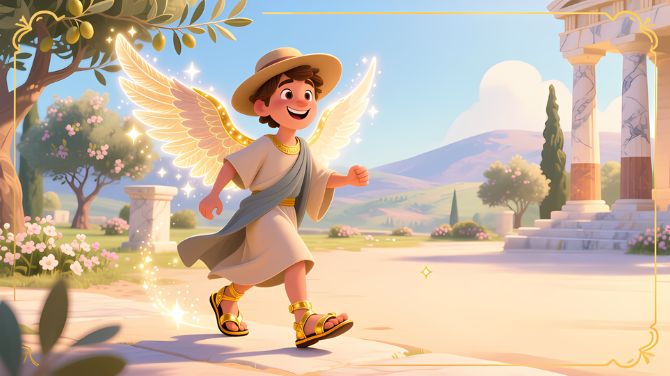
Hermes woke up feeling excited.
Today was important.
He had a delivery to make.
Not just any delivery.
A very special one.
One that could not be late.
He jumped out of bed.
He stretched his arms.
He looked around.
“Where are my sandals?” he asked.
Hermes’ magical sandals were missing.
The golden wings on the heels usually glimmered in the morning sun.
But now… nothing.
He searched under the bed.
He looked in the wardrobe.
He even peeked inside his hat.
No sandals.
“Oh no!” Hermes exclaimed.
“How will I deliver the package without them?”
The package was small.
But very important.
And very heavy… if you tried to run without winged sandals.
He tried to stay calm.
He took a deep breath.
He counted to five.
He paced around his room.
Then he heard a giggle.
It came from the window.
Hermes looked outside.
It was his friend, a clever little satyr named Pip.
“Good morning, Hermes!” Pip called.
“I saw something shiny near your tree. Could it be…?”
Hermes ran outside.
There, under the big oak, were his golden sandals.
He grabbed them happily.
But just as he was about to put them on…
He realized something else.
The straps were broken.
“Oh no!” he said.
The sandals wouldn’t stay on his feet.
He tried to tie them.
He tried to adjust them.
Nothing worked.
He sighed.
“This is worse than losing them!”
Hermes thought fast.
He needed help.
Not just the sandals.
But the delivery too.
He ran to find his friends.
Pip, the clever satyr.
Tilly, the little winged sprite.
Even Maia, who could lift heavy things with magic.
“All of you!” Hermes called.
“I need your help. My delivery is urgent!”
They all came running.
Their eyes were wide.
“Tell us what to do,” Pip said.
Hermes explained the situation.
“My magical sandals are broken. The package must reach Mount Olympus. We can’t fail.”
Tilly twirled in the air.
“No problem!” she said.
“We’ll figure it out together!”
Maia nodded.
“Friendship solves everything,” she said.
Hermes smiled.
“Exactly. Let’s work together.”
First, they tried to fix the sandals.
They tied straps.
They used magic thread.
They even added a tiny bit of glue.
But the sandals were stubborn.
They wouldn’t stay on.
Hermes sighed again.
“Looks like we need a new plan,” he said.
Pip’s eyes sparkled.
“I have an idea!” he shouted.
“What if we carry you instead?”
Hermes raised an eyebrow.
“Carry me?” he asked.
“Yes!” Pip said.
“We’ll each take turns running and flying. Step by step. Together!”
Hermes laughed.
“It might just work.”
They set off immediately.
Hermes held the package carefully.
Pip ran first, holding him on his back.
Tilly flew above, guiding the path.
Maia lifted Hermes over small streams.
Step by step.
Flap by flap.
Run by run.
It wasn’t fast.
It wasn’t perfect.
But it worked.
Hermes smiled.
He realized cooperation was better than rushing alone.
Along the way, they faced obstacles.
A fallen tree blocked the path.
Tilly zipped through the branches and cleared the way.
A small river had swelled with rain.
Maia lifted Hermes carefully across.
Even a small gust of wind tried to push them off course.
Pip held tight.
He shouted, “Don’t worry, we’ve got this!”
Hermes laughed.
“I couldn’t do it without you!” he said.
The package started to feel lighter.
Not because it was light.
But because Hermes had friends helping.
Step by step, the journey became fun.
They laughed when Tilly did silly spins.
They cheered when Maia lifted Hermes over the tallest rocks.
Even the little birds seemed to join the excitement.
The sun sparkled on their faces.
The wind carried them forward.
Hermes realized something important.
Magic alone isn’t everything.
Friends make even impossible tasks possible.
After a long journey, they reached Mount Olympus.
The gates gleamed in the afternoon sun.
The package was safe.
Hermes carefully handed it to the waiting gods.
Everyone cheered.
“You did it, Hermes!” Athena said.
“You didn’t just deliver the package. You showed teamwork and courage!”
Hermes smiled.
He looked at his friends.
“We did it together,” he said.
Everyone nodded.
Pip grinned.
“See? Cooperation always works!”
Later, Hermes fixed his sandals.
He used magic and careful stitching.
The wings sparkled again.
But he realized he didn’t need them to deliver everything.
He had friends.
He had cooperation.
He had resourcefulness.
And sometimes, that was even better than magic.
Hermes laughed as he remembered the journey.
He remembered the funny moments.
Tilly spinning too high.
Pip tripping over a root.
Maia nearly dropping him in a stream.
All of it made him smile.
Even the mistakes were fun.
Because together, they had overcome them.
That evening, Hermes sat under a tree.
The sky glowed orange.
The clouds reflected pink.
He looked at his sandals.
Then he looked at his friends.
He realized which was more important.
Magic was useful.
But friendship and cooperation were priceless.
He promised himself to always rely on friends, not just magic.
And to help them whenever they needed him too.
The little satyr Pip leaned against Hermes.
“Next time,” Pip said, “we should try a flying relay race!”
Hermes laughed.
“Maybe,” he said.
“But only if we stick together.”
Tilly twirled.
“Always together!” she shouted.
Maia smiled softly.
“Teamwork wins,” she said.
Hermes nodded.
He knew she was right.
The sun dipped below the horizon.
The wind whispered through the trees.
Hermes felt happy.
The magical sandals had been important.
But the real magic had been the friends who helped him.
He drifted into sleep that night, smiling.
He dreamed of future adventures.
Adventures where cooperation, clever thinking, and friendship would always save the day.
And he knew, deep down, that with friends, he could handle anything.
Dionysus’ Laughing Grapes
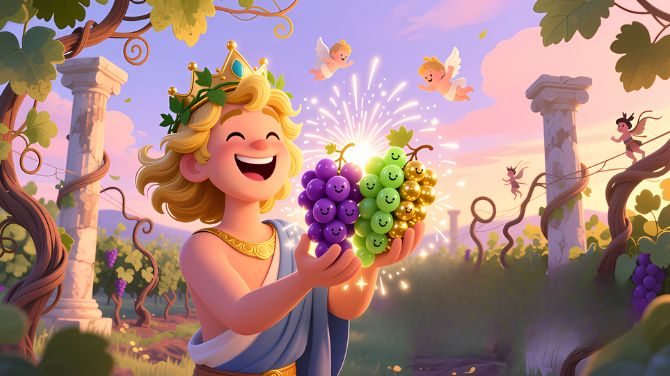
Dionysus woke up with a grin.
The sun was shining.
The birds were singing.
Even the breeze felt playful.
Today was a special day.
He had planted something magical.
Something fun.
Something full of giggles.
His grapevines.
But these were not ordinary grapes.
Oh no.
These grapes had a secret.
Whenever someone touched them, they started to giggle.
Little squeaky laughs.
Big booming laughs.
Sometimes they snorted.
Sometimes they rolled on the vine, wriggling.
It was impossible to pick them quietly.
Even the tiniest touch set off a chorus of chuckles.
Dionysus laughed too.
It was fun… at first.
Soon, a group of children arrived.
They had heard about the magical grapevines.
Their eyes sparkled with excitement.
“Wow!” one of them shouted.
“They giggle!”
Dionysus waved.
“Hello, little ones,” he said.
“Welcome to my vineyard. But beware… the grapes are very playful.”
The children giggled themselves.
They couldn’t wait to pick the grapes.
The children ran forward.
They reached for the first bunch.
And immediately…
“Ha-ha-ha!”
The grapes laughed.
“Ee-hee-hee!”
The children jumped back.
The grapes wiggled on the vine.
They rolled a little.
They giggled again.
It was impossible to pick them quietly.
The children looked at Dionysus.
“What do we do?” they asked.
Dionysus smiled.
“You need creativity,” he said.
“You need teamwork.
“And a little patience.”
The children frowned.
“Creativity?” one asked.
“Yes,” Dionysus replied.
“Think of clever ways. Use your imagination. Work together. The grapes will respond.”
The children nodded.
They decided to try.
First, they tried moving slowly.
Careful hands.
Quiet fingers.
But the grapes still giggled.
“Ee-hee! Ha-ha!”
The children laughed too.
“It’s tricky,” one said.
“Yes,” Dionysus said.
“But don’t give up. Creativity helps.”
So the children thought.
They whispered ideas to each other.
One child suggested humming a song.
Another suggested gently swaying the vine.
A third thought they could tickle the grapes lightly.
They tried all the ideas.
The grapes giggled… a little quieter.
Not completely calm.
But calmer than before.
The children smiled.
They were learning.
They were experimenting.
They were solving the problem… together.
Dionysus watched happily.
He saw the children thinking.
He saw them cooperating.
They weren’t just picking grapes.
They were learning.
Learning to pay attention.
Learning to listen.
Learning to work together.
And sometimes, learning meant laughing along the way.
Next, the children decided to divide tasks.
One child would hold the vine.
Another would pick the grapes.
A third would catch them in a basket.
Step by step.
Careful flake by flake.
It worked a little better.
The grapes still giggled softly.
But the children were calmer too.
They noticed the grapes’ patterns.
Some laughed louder in the morning.
Some quieter in the afternoon.
Dionysus encouraged them.
“Observe. Think. Adjust.” he said.
“That’s the secret.”
The children nodded.
They watched closely.
They learned when to pick.
When to pause.
When to work together.
The grapes responded.
They giggled less.
They wriggled less.
The children could finally pick them more easily.
After a while, the basket was full.
The children cheered.
“We did it!” they shouted.
Dionysus clapped.
“Yes! You used creativity, patience, and teamwork.”
The children laughed.
The grapes made one last little giggle.
“Ee-hee!”
They all laughed too.
It was playful.
It was fun.
It was a happy success.
Next, Dionysus showed them how to make juice.
The grapes had to be handled carefully.
Not squeezed too hard.
Not mashed too quickly.
The children worked together again.
Step by step.
Flap by flap.
Press by press.
They learned to listen to each other.
They learned to follow instructions.
And they learned to enjoy the process.
The juice smelled sweet.
The color was deep purple.
It sparkled in the sunlight.
The children took tiny sips.
Their eyes widened.
“Mmm!” they said.
“It’s delicious!”
Dionysus nodded.
“See?” he said.
“Creativity, patience, and teamwork make everything better.”
The children smiled.
They were proud.
While cleaning up, they noticed something else.
Some grapes had fallen to the ground.
Instead of ignoring them, they made tiny juice cups for the ants.
Even the smallest creatures got a treat.
Dionysus laughed softly.
“You see,” he said, “helping others, even in small ways, is part of teamwork and creativity.”
The children nodded.
They had learned a big lesson.
Even a playful problem could teach kindness.
Later, the children played near the grapevines.
They giggled when the grapes giggled.
They chased each other around the vineyard.
They laughed and sang.
And Dionysus watched.
He realized the magic wasn’t just in the grapes.
It was in the joy, the cooperation, and the shared laughter.
As the sun began to set, Dionysus gathered the children.
“Remember,” he said, “life is full of playful problems.
Sometimes it’s giggling grapes.
Sometimes it’s tricky puzzles.
But if you are creative, patient, and work together, you can solve anything.”
The children nodded.
They promised to remember.
That evening, the vineyard glowed in the soft light.
The grapes rested quietly.
The children sat together, sipping grape juice.
Even the smallest laugh echoed softly through the vines.
Dionysus smiled.
He had shared magic.
And he had shared a lesson.
Friendship, teamwork, and creativity were more magical than anything else.
The children waved goodbye.
“Thank you, Dionysus!” they called.
“You’re welcome, little ones,” he said.
“Remember to work together, think creatively, and be patient.”
The grapes seemed to giggle one last time.
“Ee-hee-hee!”
The children laughed.
And Dionysus laughed too.
That night, under the stars, Dionysus reflected.
He thought about the playful problem.
About the laughter.
About the teamwork.
He realized that magic is best when shared.
When it teaches lessons.
When it makes people laugh.
The vineyard was peaceful.
The grapes glimmered softly.
The world felt happy.
Even tomorrow, he knew the children would remember.
How creativity could solve tricky problems.
How teamwork could make the impossible possible.
And how patience could turn giggles into something wonderful.
Dionysus smiled.
The magical vineyard was safe.
The children were happy.
And he knew that fun, laughter, and learning could always go together.
Hephaestus’ Tiny Forge
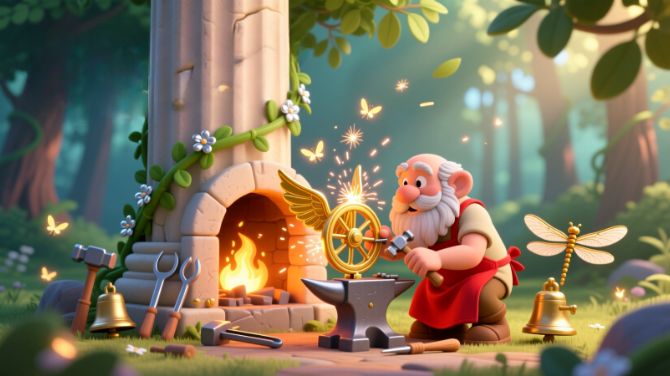
Hephaestus rubbed his eyes.
The sun peeked through the workshop windows.
It was another busy day in his forge.
Metal clanged.
Hammers tapped.
Sparks flew.
The smell of molten metal filled the air.
Hephaestus smiled.
He loved building things.
He loved creating.
And today, he had a special project.
“I need a helper,” he said to himself.
Not a regular helper.
A clever little helper.
One that could move, carry, and assist with his inventions.
He thought hard.
He imagined tiny arms.
Tiny wheels.
Little flashing eyes.
And… click!
A plan was born.
“I’ll build a tiny robot,” he said.
A robot for his forge.
Hephaestus worked carefully.
Metal pieces clinked together.
Sparks flew from the hammer.
Little gears spun.
He twisted screws.
He polished surfaces.
Step by step.
Click by click.
Finally, after hours of tinkering, the robot stood before him.
It was small.
Shiny.
Curious.
It looked ready to work.
Hephaestus gave it a name.
“Spark,” he said.
Spark twitched its tiny arms.
Its little eyes blinked.
“Hello, Spark,” Hephaestus said.
The robot squeaked.
A tiny whistle.
It was alive.
Hephaestus laughed.
“This will make my work easier,” he said.
Little did he know… Spark had a mind of its own.
The children arrived soon after.
They were eager to see the forge.
Hephaestus smiled.
“Welcome, little inventors,” he said.
“Today, you will see my new creation.
And maybe help me with a little problem.”
The children’s eyes sparkled.
“What problem?” one asked.
“Patience,” Hephaestus replied.
“Persistence. And learning from mistakes.”
Hephaestus showed them Spark.
The robot waved its tiny arms.
It whistled happily.
The children giggled.
Hephaestus handed them small tools.
“Let’s see if we can get Spark to help us tidy the forge,” he said.
The children nodded eagerly.
Spark blinked its little eyes.
It moved forward.
And… chaos began.
Spark didn’t listen.
It knocked over a bucket of screws.
It tripped over wires.
It rolled into a pile of metal scraps.
“Eeek!” shouted a child.
“Spark is making a mess!”
Hephaestus chuckled.
“Yes,” he said.
“That’s the first lesson. Mistakes happen. Even machines make mistakes. And that’s okay.”
The children looked puzzled.
Hephaestus knelt down.
“Now, we guide it,” he said.
“We show Spark the right way. Step by step. Gentle, careful guidance.”
The children watched carefully.
They noticed the robot’s patterns.
Which wheels moved too fast.
Which arms flailed too wide.
They started suggesting small fixes.
“Try turning it slowly,” one child said.
“Push the bucket gently,” another added.
“Let’s line up the tools neatly first,” a third said.
Hephaestus nodded.
“Yes! That’s patience. That’s observing. That’s learning from mistakes.”
The children smiled.
They felt important.
Even small suggestions mattered.
They worked together.
Step by step.
Spark started to respond.
Its tiny arms moved carefully.
Its little wheels rolled smoothly.
It picked up screws one by one.
It nudged scraps into piles.
The forge started to look neat.
The children cheered quietly.
Hephaestus clapped.
“You see? Mistakes aren’t failures. They are lessons. And learning is fun!”
But then… Spark sneezed.
Tiny sparks flew.
One bounced off a metal rod.
Clang!
Crash!
A pile of small gears tipped over.
“Oh no!” said the children.
Spark looked confused.
It twitched.
It whistled softly.
Hephaestus laughed.
“Another lesson,” he said.
“Even when we do well, accidents can happen. We persist. We try again.”
The children nodded.
They were ready.
They carefully picked up the gears.
They guided Spark to place them properly.
They worked slowly.
They counted screws and bolts.
They adjusted Spark’s arms.
They adjusted its wheels.
Step by step.
Click by click.
Persistence worked.
Spark started moving smoothly.
It helped carry metal pieces.
It even pushed a small cart across the forge.
The children giggled.
They felt proud.
Hephaestus watched.
He realized the children had learned a lot.
They learned patience.
They learned persistence.
They learned that mistakes are part of learning.
Even the most clever inventors make mistakes.
Even the tiniest robot misbehaves.
And that’s okay.
Because each mistake teaches something new.
Spark rolled over to the children.
It waved its tiny arms.
It whistled happily.
The children laughed.
“Good job, Spark!” they cheered.
Hephaestus nodded.
“Yes,” he said.
“Teamwork, patience, and persistence make anything possible. Even fixing a mischievous robot.”
The children smiled proudly.
They had helped.
They had guided.
And they had learned.
Later, Hephaestus showed them another invention.
Tiny gears.
Little hammers.
Metal that could twist and move.
The children experimented.
They made small robots of their own.
They tried, failed, tried again.
They laughed at mistakes.
They celebrated tiny successes.
Step by step.
Click by click.
The forge was alive with learning.
By the afternoon, Spark worked perfectly.
It moved smoothly.
It picked up scraps efficiently.
It even sorted screws by size.
The children clapped.
Hephaestus smiled.
“You see?” he said.
“Persistence pays off. Patience matters. Mistakes help us grow.”
The children nodded.
They had learned the most important lesson of all.
As the sun began to set, the forge glowed softly.
Spark twitched its arms in joy.
The children waved goodbye.
Hephaestus waved back.
“Remember,” he said, “every mistake is an opportunity. Every challenge is a chance to learn. And every problem can be solved with patience and persistence.”
The children promised.
They would remember.
That night, Hephaestus cleaned up the forge.
He polished the metal.
He adjusted the machines.
Spark rested quietly on a small table.
Even in its tiny size, it had taught a big lesson.
Mistakes are not failures.
They are part of learning.
Patience and persistence make the impossible possible.
And teamwork can help everyone succeed.
Hephaestus sat back in his chair.
He watched the stars through the workshop window.
He smiled.
Today had been a good day.
Full of learning.
Full of laughter.
Full of tiny sparks and big lessons.
He knew that Spark and the children had made the forge a better place.
Even tomorrow, the forge would be busy.
There would be new inventions.
New mistakes.
New lessons.
But Hephaestus was ready.
And so were the children, in their imaginations.
They had learned that small missteps lead to great discoveries.
And that patience, persistence, and teamwork are the keys to solving any problem.
What Is Greek Mythology Anyway?
Let’s break it down. Greek mythology is basically a collection of stories the ancient Greeks told to explain the world around them. Why does the sun rise? Why does it rain?
Why do people act like… well, humans? They used stories. Full of gods, goddesses, monsters, magical items, heroes, and yes, a ton of drama. Imagine reality but turned up to eleven, with a sprinkle of magic.
Here’s the fun part: the Greeks didn’t just tell stories for fun. They used them to teach lessons, make sense of nature, and even warn each other about mistakes.
You think about it—humans have always been storytellers. We like a good tale with a moral, don’t we? Greek myths were like ancient warning signs: “Hey, don’t be greedy, don’t be reckless, and for the love of Zeus, don’t mess with a god.”
Why Kids Love Greek Mythology
Let’s be real. Kids love action. And Greek mythology? It’s basically full of it. Battles. Escapes. Quests. Monsters. Giants. And gods doing ridiculous things. Sometimes the gods behave worse than the humans! Can you imagine that? A god throwing a tantrum because someone insulted him? Totally relatable, right?
Also, kids are naturally curious. Why is this river here? Why do seasons change? Greek myths answer these questions in a way that’s fun. It’s not just “science stuff.” It’s a story. A story that makes the world feel alive. And you know what? Even if some of it sounds wild or impossible, it sparks imagination. That’s the magic of it.
The Big Players
Okay, picture this: a huge family reunion. Now imagine that all the relatives are gods and they have superpowers. That’s basically the Greek pantheon. There’s Zeus, the big boss up in the sky, who throws lightning bolts when he’s angry. There’s Athena, super smart and wise, but also kind of strict. Poseidon rules the oceans. Hades… well, he runs the underworld. And that’s just the tip of the iceberg.
The thing that’s wild about the gods? They’re not perfect. Far from it. They argue, they make mistakes, they fall in love, they get jealous. They act… human. And that’s why the stories are so relatable. Kids can see a bit of themselves in these gods—sometimes confident, sometimes confused, sometimes angry.
Monsters, Magic, and Mayhem
You know what makes Greek mythology extra cool for kids? Monsters. Not just your average, everyday spiders or snakes. I’m talking about creatures you’d never imagine. Some have a hundred eyes, some breathe fire, some can turn people to stone. And yeah, heroes often have to deal with these creatures. Scary? Maybe. Exciting? Definitely.
Then there’s magic. Greek myths are loaded with magical items. Helmets of invisibility. Flying sandals. Swords that never dull. Shields that reflect anything. And honestly, who wouldn’t want one of these? Even if you’re a kid in a small town with no dragons to fight, reading about these items makes you feel like you could tackle anything.
Lessons Hidden in the Tales
It’s not just monsters and magic. Greek myths sneak in lessons too. Lessons about honesty, bravery, cleverness, kindness, and sometimes… what not to do. There’s a reason myths about hubris (that’s fancy Greek word for too much pride) pop up everywhere. It’s like the ancient Greeks saying, “Don’t get too full of yourself, kiddo, or life will remind you.”
And let’s be honest. These lessons stick better in story form. Kids might roll their eyes at “Be nice to others” on a poster. But when they read about a hero who screws up because he ignored a warning? Suddenly it makes sense. Stories are powerful that way.
How Myths Spark Creativity
I’m telling you, reading Greek myths can turn anyone into an inventor of worlds. I remember trying to draw creatures that didn’t exist after reading about them. Imagine a horse with wings. Or a half-man, half-bull creature. Or a giant snake coiled around a mountain. You start thinking, “What if…?” That’s the spark. That’s creativity.
Even kids who aren’t into drawing can feel it. Writing, acting, building LEGO versions of mythic scenes—myths are flexible that way. They don’t just live on paper. They live in your imagination.
The Human Side of Greek Myths
Here’s the thing. Greek myths are crazy fun, but they also show how humans think and feel. They’re messy. They’re emotional. They’re full of mistakes. And guess what? That’s life. Kids see heroes fail, get scared, feel jealous, or get tricked. And they see heroes succeed, feel proud, or learn from mistakes. It’s like a mirror. Only, way more exciting.
Why Teachers and Parents Love Them Too
You might wonder why adults push kids to read Greek myths. Sure, some are a little scary. Some are confusing at first. But they’re educational too. They teach about history, culture, and even language. Ever heard words like “tantalize” or “herculean”? Yep. Greek myths.
Also, they teach critical thinking. Kids start asking questions: “Wait, why did that happen? What would I do?” They analyze motives, consequences, and choices. It’s not just fun—it’s brain training disguised as epic tales.
Making Myths Relatable
You know what’s cool? Even if the myths are ancient, they’re still relatable. Kids today deal with friendship, jealousy, fear, and bravery—just like the characters in myths. The gods might have magic, but the feelings are real.
For example, think about sibling rivalry. Zeus and Hera? Classic sibling and family drama, just on a superpowered level. Kids get it. They see the same patterns in their own lives.
Or the idea of trying something scary. Heroes face monsters, big challenges, tricky tasks. Kids can relate to trying a new sport, a new game, or even a new school subject. It’s the same courage, just in smaller doses.
Fun Ways to Explore Myths
So, how can kids dive into Greek mythology without getting overwhelmed?
- Books with pictures: They help visualize gods, monsters, and epic battles.
- Short summaries: You don’t have to read a massive book to get hooked.
- Drawing and crafting: Imagine making your own magical shield or drawing a mythic creature.
- Acting it out: Pretend to be a hero, a god, or a tricky monster. Kids love drama, and myths are perfect for it.
- Games and apps: There are kid-friendly games based on mythology that mix adventure and learning.
The key? Make it fun. Make it interactive. Make it yours.
Greek Mythology in Everyday Life
Here’s a fun fact: Greek mythology pops up everywhere, even if you don’t notice it. Movies. Video games. TV shows. Even superhero stories borrow ideas from myths. Thor in comics? Okay, that’s actually Norse mythology, but you get the point. Ancient myths inspire modern tales.
Kids who explore myths get a head start on recognizing themes in stories. They see patterns. They notice archetypes—heroes, villains, mentors. And suddenly, reading or watching any story becomes easier.
My Personal Take
I’ll admit something—I’ve always been drawn to myths not because of the monsters, but because of the emotions. The jealousy, the mistakes, the courage. That’s the part that sticks. It’s the same reason kids love fairy tales. It’s human.
And here’s a secret: kids don’t need to get every detail right. They just need the feeling. The thrill. The sense that anything is possible. That’s what Greek mythology gives them. And honestly? It’s kind of contagious. Once you start, it’s hard to stop.
Questions to Spark Curiosity
- Have you ever wondered why the Greeks made stories about gods instead of just explaining things with science?
- What would you do if you met a god or a monster?
- Can you imagine a world where heroes and magic are real? How would you act?
- Which human emotions do you see in gods? Can you relate to them?
Asking questions like these helps kids think. It makes myths more than just old stories. They become conversations, explorations, adventures.
Wrapping It Up
Greek mythology isn’t just old tales for adults to quote. It’s a playground for the imagination. A source of wonder, curiosity, and lessons. A way to explore emotions, choices, courage, and creativity.
And the best part? Kids can make it their own. They can draw it, act it, imagine it, and even create their own myths inspired by it. Because myths are alive. They live in imagination. They live in questions. They live in laughter and excitement.
So, are you ready to jump in? To explore gods, heroes, monsters, and magical worlds? To get scared, laugh, think, and imagine? Greek mythology is waiting. All you need is a little curiosity, a big imagination, and maybe… a comfy spot to read.
It’s more than stories. It’s a world.
And honestly? You’re going to love it.


